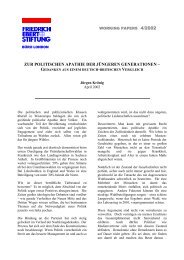Where Now for European Social Democracy? - Policy Network
Where Now for European Social Democracy? - Policy Network
Where Now for European Social Democracy? - Policy Network
Create successful ePaper yourself
Turn your PDF publications into a flip-book with our unique Google optimized e-Paper software.
58WHERE NOW FOR EUROPEAN SOCIAL DEMOCRACY?political programme. However, 11 of the 15 Heads of Government whoagreed it were of the Left. When the <strong>European</strong> Council meets inDublin, in a month’s time, to review progress in implementing theLisbon strategy, only three of those centre-left leaders will still bepresent: Blair, Persson and Schröder. Lisbon nevertheless has gainedthe status of the economic re<strong>for</strong>m benchmark. It still represents themost comprehensive attempt to devise a governing programme <strong>for</strong>economic and social modernisation in Europe.As a programme of re<strong>for</strong>m, Lisbon has so far brought limitedresults. The <strong>European</strong> Commission’s report to this year’s Spring Councilwarns of “still much to do” and “major problems which need to betackled urgently” 1 . However, my argument is that Lisbon representsmore than a ‘what matters is what works’ consensus among policymakers. Rather it has real potential as a distinctive model of politicaleconomy <strong>for</strong> the progressive left. For social democrats, our failure tograsp Lisbon represents a great missed opportunity. We should useLisbon to modernise domestic party programmes, as a point ofideological differentiation with the Right and to demonstrate thepotential of the <strong>European</strong> project to achieve social democratic goalsthat are no longer within reach of nation states alone.Why Lisbon is right on economic re<strong>for</strong>mSome on the Left take issue with the premise on which Lisbon isbased: that the <strong>European</strong> model of social market capitalism facesfundamental challenges. Caution about the evidential basis <strong>for</strong>Europessimism is certainly justified. The impact of the shock ofGerman unification on the core of the <strong>European</strong> economy has beenprolonged, but in terms of international competitiveness, Germany isvery far from being the ‘basket case’ of Eurosceptic myth. Statisticalcomparisons between EU and US per<strong>for</strong>mance can be simplistic. HigherUS growth rates in part reflect an expanding work<strong>for</strong>ce: USper<strong>for</strong>mance is less impressive by comparison with Europe on a percapita basis. Similarly, higher US productivity growth is in part theresult of longer hours worked; and, arguably, most <strong>European</strong>s, otherthan the British, have a perfectly reasonable preference <strong>for</strong> leisure.



